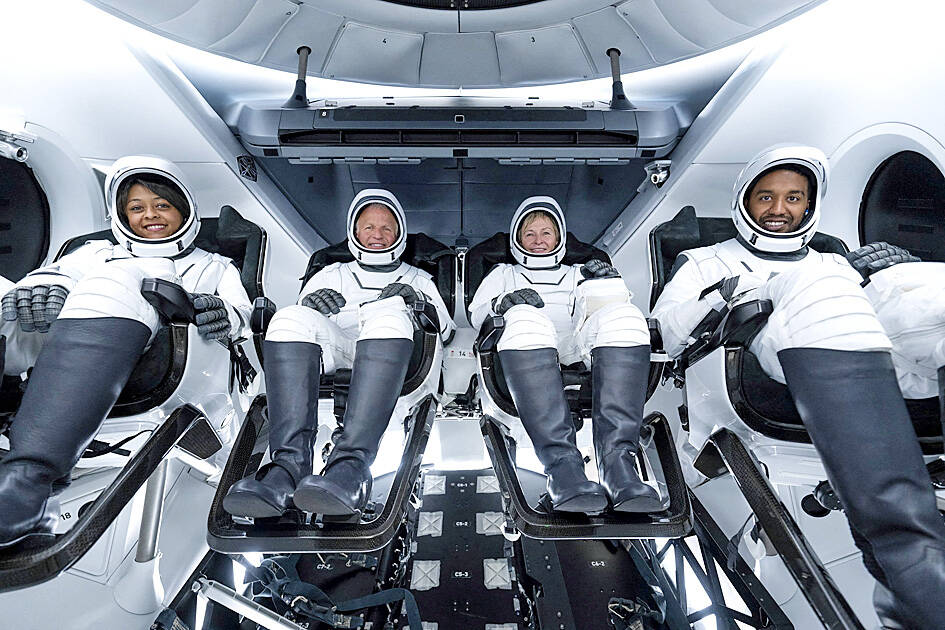A private mission to the International Space Station (ISS) organized by Axiom Space was yesterday to blast off from Florida, carrying the first two Saudi Arabian astronauts to the orbiting laboratory.
Rayyanah Barnawi, a breast cancer researcher, was to become the first Saudi Arabian woman to voyage into space and would be joined on the mission by compatriot Ali al-Qarni, a fighter pilot.
The Axiom Mission 2 crew were to take off aboard a SpaceX Falcon 9 rocket from the Kennedy Space Center at Cape Canaveral at 9:37pm GMT. The team also includes Peggy Whitson, a former NASA astronaut who would be making her fourth flight to the ISS, and John Shoffner, a businessman from Tennessee who would serve as pilot.

Photo: Saudi Press Agency / handout via Reuters
They are due to spend about 10 days on board the ISS, where they should arrive at about 5:30pm GMT today.
“Being the first Saudi woman astronaut, representing the region, it’s a great pleasure and honor that I’m very happy to carry,” Barnawi told a news conference.
She added that, aside from her excitement for the research she would carry out on board, she is looking forward to sharing her experience with kids while on the station.
“Being able to see their faces when they see astronauts from their own region for the first time is very thrilling,” she said.
A career fighter pilot, al-Qarni said he has “always had the passion of exploring the unknown and just admiring the sky and the stars.”
“It is a great opportunity for me to pursue this kind of passion that I have, and now maybe just fly among the stars,” he said.
The mission is not Saudi Arabia’s first foray into space.
In 1985, Prince Sultan bin Salman bin Abdulaziz, an air force pilot, participated in a US-organized space voyage.
The space mission involving a Saudi Arabian woman is the latest move by the oil-rich Gulf kingdom, where women only gained the right to drive a few years ago, to revamp its ultraconservative image.
The kingdom established the Saudi Space Commission in 2018 and launched a program last year to send astronauts into space.

The Burmese junta has said that detained former leader Aung San Suu Kyi is “in good health,” a day after her son said he has received little information about the 80-year-old’s condition and fears she could die without him knowing. In an interview in Tokyo earlier this week, Kim Aris said he had not heard from his mother in years and believes she is being held incommunicado in the capital, Naypyidaw. Aung San Suu Kyi, a Nobel Peace Prize laureate, was detained after a 2021 military coup that ousted her elected civilian government and sparked a civil war. She is serving a

China yesterday held a low-key memorial ceremony for the 1937 Nanjing Massacre, with Chinese President Xi Jinping (習近平) not attending, despite a diplomatic crisis between Beijing and Tokyo over Taiwan. Beijing has raged at Tokyo since Japanese Prime Minister Sanae Takaichi last month said that a hypothetical Chinese attack on Taiwan could trigger a military response from Japan. China and Japan have long sparred over their painful history. China consistently reminds its people of the 1937 Nanjing Massacre, in which it says Japanese troops killed 300,000 people in what was then its capital. A post-World War II Allied tribunal put the death toll

‘NO AMNESTY’: Tens of thousands of people joined the rally against a bill that would slash the former president’s prison term; President Lula has said he would veto the bill Tens of thousands of Brazilians on Sunday demonstrated against a bill that advanced in Congress this week that would reduce the time former president Jair Bolsonaro spends behind bars following his sentence of more than 27 years for attempting a coup. Protests took place in the capital, Brasilia, and in other major cities across the nation, including Sao Paulo, Florianopolis, Salvador and Recife. On Copacabana’s boardwalk in Rio de Janeiro, crowds composed of left-wing voters chanted “No amnesty” and “Out with Hugo Motta,” a reference to the speaker of the lower house, which approved the bill on Wednesday last week. It is

FALLEN: The nine soldiers who were killed while carrying out combat and engineering tasks in Russia were given the title of Hero of the Democratic People’s Republic of Korea North Korean leader Kim Jong-un attended a welcoming ceremony for an army engineering unit that had returned home after carrying out duties in Russia, North Korean state media KCNA reported on Saturday. In a speech carried by KCNA, Kim praised officers and soldiers of the 528th Regiment of Engineers of the Korean People’s Army (KPA) for “heroic” conduct and “mass heroism” in fulfilling orders issued by the ruling Workers’ Party of Korea during a 120-day overseas deployment. Video footage released by North Korea showed uniformed soldiers disembarking from an aircraft, Kim hugging a soldier seated in a wheelchair, and soldiers and officials